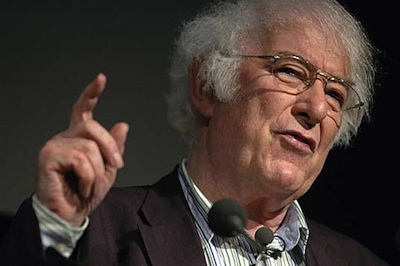
Tributes to the Nobel prize winner Derry poet Seamus Heaney has dominated the Irish media following the announcement of his death this morning, Friday 30th August.
He died following a short illness and his death has come as a shock.
The son of a farmer from Bellaghy and the eldest of nine children, Mr Heaney died following a short illness and his death has come as a shock.
He is being remembered as one of the greatest poets of the last hundred years.
His publisher Faber and Faber issued a statement on behalf of the family and went on to describe the poet as a world great and an inspiration for the company.
“We cannot adequately express our profound sorrow at the loss of one of the world’s greatest writers,” a spokeswoman for Faber and Faber said.
“His impact on literary culture is immeasurable.”
Fellow poet Michael Longley, a friend of Heaney, said he wrote some of the world’s finest nature poems.
“I was very pleased that a few months ago I was able to tell him that I’d been reading his early poems, the poems he wrote as a young man, and that they struck me as miracles.
“And he joked, he says, ‘well they came from Bellaghy, they’d have to have been miracles’.
“And he continued to produce miracles right the way through his life.”
The citation for the 1995 Nobel literature award praised Heaney “for works of lyrical beauty and ethical depth, which exalt everyday miracles and the living past”.
Among the other awards he received, a year after his Nobel win he was made a Commandeur de L’Ordre des Arts et Lettres by the French ministry of culture.
Educated at St Columb’s College, Derry and later at Queen’s University Belfast, Heaney made his home in Dublin where he worked at Trinity College Dublin.
His world renowned poetry first came to public attention in the mid-1960s with his first major collection, ‘Death Of A Naturalist’, published in 1966.
His experiences of the conflict were seen through the darkened mood of his later work, such as the 1975 collection ‘North’.
His poems on the conflict stopped short of offering a a direct political opinion. Instead, he addressed the violence in a wider historical context and wrote elegies to friends and acquaintances who were killed.
But he declined to become British poet laureate for political reasons, commenting “I’ve nothing against the Queen personally: I had lunch at the Palace once upon a time”.
He published “Requiem for the Croppies” on the 50th anniversary of the 1916 Easter Rising, a poem that commemorates the Irish rebels of 1798. He described the poem as “silence-breaking rather than rabble-rousing”.
His most commonly cited political statement came in 1982 when he objected to being included in an anthology of British poetry. He wrote: “Be advised my passport’s green. No glass of ours was ever raised to toast the Queen.”
Sinn Féin leader Gerry Adams expressed sadness at the death. “I knew and was very fond of Seamus. He was a wonderful man as well as a literary figure of huge international stature.”
Irish President Michael D Higgins said Heaney’s contribution to the “republics of letters, conscience, and humanity” was immense. “The presence of Seamus was a warm one, full of humour, care and courtesy,” he said.
“Generations of Irish people will have been familiar with Seamus’ poems. Scholars all over the world will have gained from the depth of the critical essays, and so many rights organisations will want to thank him for all the solidarity he gave to the struggles within the republic of conscience.”
![[Irish Republican News]](https://republican-news.org/graphics/title_gifs/rn.gif)
![[Irish Republican News]](https://republican-news.org/graphics/title_gifs/harp.gif)

